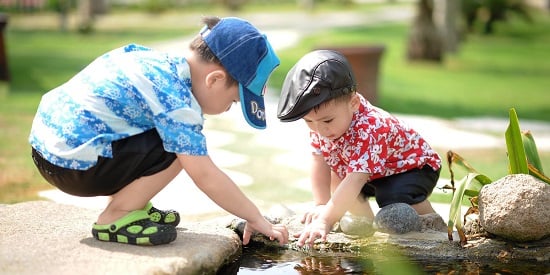'Bush kinder' builds early understanding of STEM fundamentals
Media release
Pre-school aged children who participate in 'bush kinder' programs could have better education outcomes than those who stay indoors, a Deakin study shows.
Girls benefit the most from engaging in non-gendered outdoor play because it allowed greater freedom to play creatively with unstructured natural materials, School of Education research fellow Chris Speldewinde said.
His article, co-authored by Deakin University Professor Coral Campbell and funded through the Centre for Research for Educational Impact, Bush kinders: enabling girls' STEM identities in early childhood, found children who spend a year attending bush kinder once per week as part of their normal kindergarten curriculum built a deeper understanding of science, technology, engineering, and maths (STEM).
Interacting with fallen leaves, sticks and fixed natural structures such as trees helped young children form an understanding of technology that could lead to early experimentations with engineering, he said. Investigating the science of floating and sinking using natural materials and small bodies of water also had benefits, as did using sticks to draw in dirt or sand.
"Unstructured, outdoor play allows girls and boys to put away their dolls and stuffed toys and interact creatively with the environment around them to learn crucial STEM fundamentals," Mr Speldewinde said.
"This is important if you consider job opportunities in STEM are among the fastest growing in Australia. People with qualifications in STEM also earn more than those without STEM qualifications."
Forest school and nature-based learning had become increasingly popular in the United Kingdom and parts of Europe over the past half century, but Mr Speldewinde said the benefits of STEM-learning in these environments had, until now, received little research attention.
Their Deakin study found children aged 4 to 5 who spent time outdoors were more confident and inquisitive when exploring the natural world around them. Bush kinder also had the added benefit of fostering an appreciation for the environment among young children and provided an early opportunity to expose them to Indigenous cultures.
"Just a fraction of the state’s approximately 2500 kindergartens run bush kinder sessions. As of last year, just over 150 kindergartens across Victoria incorporated bush kinder into their programs," Mr Speldewinde said.
"All Victorian kindergartens, where possible, should aim to integrate a day of bush kinder into their curriculum each week. But what we find is a lack of training, educator confidence, and problems finding an appropriate location can be a challenge to implementing this."

